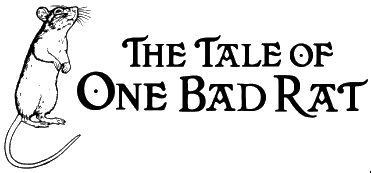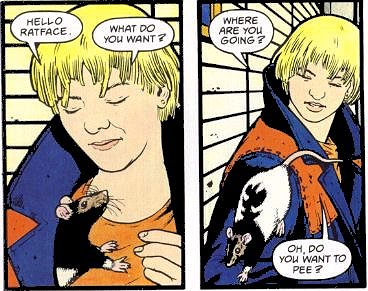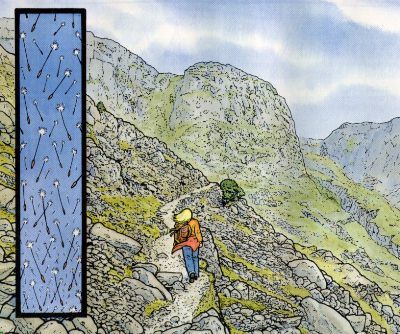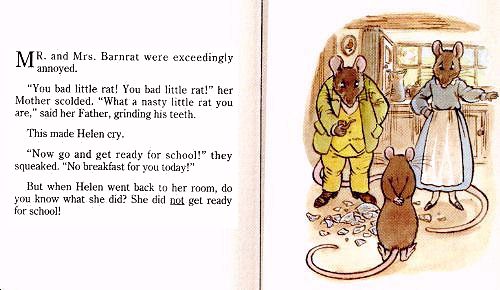The Tale of One Bad Rat

 A strange thing happened to Bryan Talbot on his way to writing a book about the Lake District.
A strange thing happened to Bryan Talbot on his way to writing a book about the Lake District.
Looking for a “hook”, he got side-tracked into the world of former Lake District resident Beatrix Potter, the creator of the oh-so-charming anthropomorphic animal comics which people buy for their young children as “storybooks”. Then, trying to create a modern character to focus his travelogue around, he got side-tracked into an “issue” story. Fortunately, these unexpected detours often make for the most interesting journeys.
 The Tale of One Bad Rat is about a homeless adolescent girl named Helen and her pet rat. Like most girls (as well as many boys) on the street, she ran away from home to escape sexual abuse from a family member. And like so many runaway Britons, she ran to London, where we find her in a tube station, begging… and blaming herself.
The Tale of One Bad Rat is about a homeless adolescent girl named Helen and her pet rat. Like most girls (as well as many boys) on the street, she ran away from home to escape sexual abuse from a family member. And like so many runaway Britons, she ran to London, where we find her in a tube station, begging… and blaming herself.
The first section tells of her experiences in the city, both good and bad. Through these encounters, some well-executed flashbacks, and a series of imaginative visions, we begin to get a picture of this fresh-faced young woman and the demons that haunt her. We also get to know (and to a lesser extent, understand) the rat she keeps with her, the only “person” she allows close enough to touch her. “They’re cleaner than people!” she explains in a rare moment of openness with her new-found friend Ben. “No, they’ve just had a really bad press.”
I’ve already “spoilt” the fact that this book is (sort of) about the Lake District, so you’ve probably figured out that Helen eventually makes her way north. On the way, we learn more about the frightening events that led her to leave home. But through this dark journey, best online casino she finally arrives in the same land that inspired the shy Miss Potter to overcome her repressive childhood, and create a series of beautiful “Tales” books, the most famous being The Tale of Peter Rabbit.
 The Lake District, an area in northwest England whose natural beauty has inspired many poets and other writers, genuinely is a wondrous place. More than a dozen years later, it’s one of the places I remember most vividly and fondly from my cycling tour of Great Britain. (Talbot, who as a native has seen far more of Britain than I, expresses similar feelings in his comments at the back of the book.) I can vouch for the authenticity of Talbot’s scenery… but frankly, I don’t think he really captured the ruggedly diverse beauty of the area. I suppose I shouldn’t expect the impossible from pen, ink, and (I assume) watercolors. {smile}
The Lake District, an area in northwest England whose natural beauty has inspired many poets and other writers, genuinely is a wondrous place. More than a dozen years later, it’s one of the places I remember most vividly and fondly from my cycling tour of Great Britain. (Talbot, who as a native has seen far more of Britain than I, expresses similar feelings in his comments at the back of the book.) I can vouch for the authenticity of Talbot’s scenery… but frankly, I don’t think he really captured the ruggedly diverse beauty of the area. I suppose I shouldn’t expect the impossible from pen, ink, and (I assume) watercolors. {smile}
Nonetheless, authentic realism was clearly one of Talbot’s priorities. The characters are all based (visually) on real people (Helen’s personality is a composite of both Potter and several abuse victims), and the various scenes take place in real locations in London and the Lake District. Not only does this serve the serious, real-life aspect of the story he’s telling, the straightforward artistic style also reflects Potter’s imaginary stories, which included scenes drawn from real places, in simple but detail-sensitive illustrations. It also makes the book more accessible to those not accustomed to the usual stylistic idiosyncrasies of the comic-book medium.
The use of various regional British accents and slang can make the dialog a little difficult to follow; it may help to read it aloud (provided you can “do” credible British accents). It does enhance the realism, however.
It’s here in the Lake District that Helen must face the influences that are suppressing her and her creative potential. Some of the plot developments seem a little too “convenient” toward this end, but they serve to move along a character development that is as dramatic as it is moving. The steep, often-rocky fells and the still, deep waters of the meres serve as the perfect (somewhat symbolic) backdrop for all this.

Just before the end of the story, Talbot inserts a short “lost” Potter story (entitled, in case you hadn’t guessed, The Tale of One Bad Rat), which serves as an allegory for Helen’s life. It’s been a while since I’ve read any real Potter, but it seems true to her style, both narratively and illustratively. Again, its appearance here is a bit contrived, but it serves as a nice catalyst for the final, beautiful scene.
Yes, The Tale of One Bad Rat is an “important” book, looking at the taboo of incest, by peeling away the far larger taboo against discussing it. But it’s also an award-winning, engaging story, told poignantly through subtle characterisation and some beautiful art.
